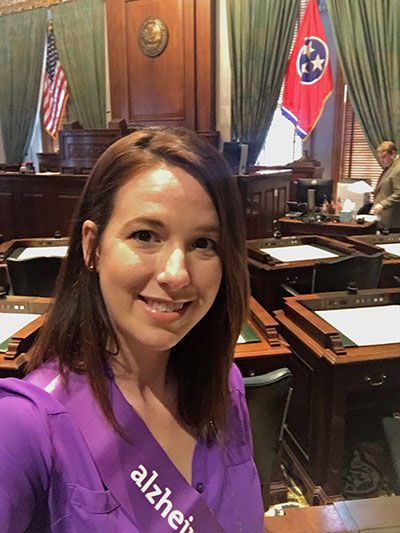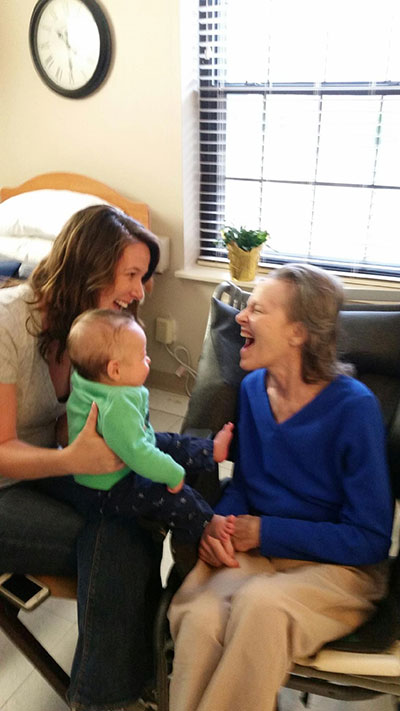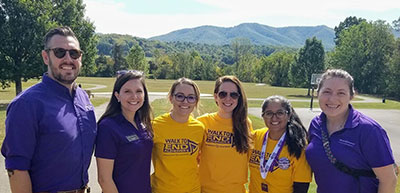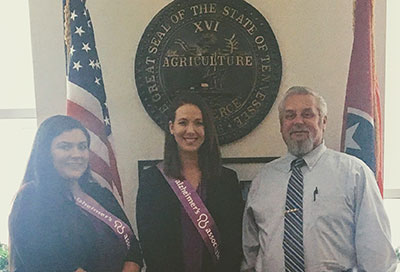
Double Your Impact for the Holidays
Double Your Impact for the Holidays
Your urgently needed year-end gift can go twice as far to provide care and support and accelerate Alzheimer's research this holiday season — and all year long. Show your giving spirit today during this 2x Match Challenge.
Donate NowAt the 2018 Alzheimer’s Association Tennessee State Advocacy Day, Leah White told the story of her mother, Carol Dyer, who battled younger-onset Alzheimer’s disease for eight years before she passed away in 2016. While sharing her mother’s story with fellow advocates, Leah called on them to help her fight back. "Working to make tangible changes for others in my mother’s honor has been cathartic and empowering," Leah says.
 In addition to state advocacy efforts, Leah has also advocated on the federal level, having met with elected officials at the Alzheimer’s Impact Movement Advocacy Forum in Washington, D.C. Strengthened by progress made and learning about other advocates’ stories, Leah has no intention of slowing down; in honor of her mom, she is actively fighting for change.
In addition to state advocacy efforts, Leah has also advocated on the federal level, having met with elected officials at the Alzheimer’s Impact Movement Advocacy Forum in Washington, D.C. Strengthened by progress made and learning about other advocates’ stories, Leah has no intention of slowing down; in honor of her mom, she is actively fighting for change.Long Road to Diagnosis
Carol, a vibrant woman who worked hard in an outside sales position, was also helping to care for her own parents and manage their farm. At the age of 54, she began showing symptoms that included the inability to pick up on social cues.
On her wedding day, Leah recalls seeing her mother appear confused and unable to immediately understand that she needed to join group family photos. Carol also wandered a bit at the wedding, having “a look that she was lost, a distance in her eyes.”
The symptoms continued and became more problematic; eventually, Carol was unable to work because she couldn’t do simple math. "At first we thought the symptoms were stress-related, but they didn’t go away," Leah says. "That distance, that look of being lost, never faded." While working with her stepfather and brothers to provide care for her mother, Leah was also raising her two young sons with husband, Patrick.
 Because Carol was young, healthy and fit, Alzheimer’s wasn’t initially considered. However, five years after she began showing symptoms, a PET scan confirmed an Alzheimer’s diagnosis. By that time, Carol had progressed to the late stage of the disease.
Because Carol was young, healthy and fit, Alzheimer’s wasn’t initially considered. However, five years after she began showing symptoms, a PET scan confirmed an Alzheimer’s diagnosis. By that time, Carol had progressed to the late stage of the disease.After more than six years of caring for Carol at home, the family made the difficult decision to move her into a skilled nursing facility, and a year and half later, she passed away at the age of 61.
Advocating for Change
With encouragement from her husband, Leah became involved with the Alzheimer’s Association about a month after her mother’s death. First, she formed a team with family and friends raising more than $10,000 for the Johnson City Walk to End Alzheimer’s in 2016. She became an event chair the following year. “We needed to fill this hole in our hearts, needed a bigger purpose for eight years of struggling — what better way than to help other people?” Leah says.
After participating in Walk to End Alzheimer’s, Leah learned about the Association’s advocacy efforts, including how advocates communicate with elected officials to help improve the quality of life for people with Alzheimer’s and their families. Advocates like Leah receive regular updates about current legislative and public policy issues, share petitions and make phone calls, participate in events, and share their personal experiences with Alzheimer's disease.
 In the fall of 2017, Leah took her advocacy work one step further by becoming an Ambassador, the main point of in-district contact for a member of Congress. She continues to develop an advocacy team to help raise awareness and communicate with elected officials to pass key legislation. "I did not have a background in politics and had never been active in advocacy before becoming an Ambassador," Leah says. "The Alzheimer's Association saw my passion for the cause, encouraged me to become an advocate, and provided training, education and guidance."
In the fall of 2017, Leah took her advocacy work one step further by becoming an Ambassador, the main point of in-district contact for a member of Congress. She continues to develop an advocacy team to help raise awareness and communicate with elected officials to pass key legislation. "I did not have a background in politics and had never been active in advocacy before becoming an Ambassador," Leah says. "The Alzheimer's Association saw my passion for the cause, encouraged me to become an advocate, and provided training, education and guidance."Leah continues to share her mother Carol’s story to advocate, recruit volunteers and fundraise for the Alzheimer’s Association, emphasizing that a background in public policy isn’t required — to become an advocate, you just need to have a passion for the cause and willingness to learn. “Anyone can be an advocate or Ambassador for a cause they believe in, and you don’t have to be politically savvy to get involved,” Leah says. “You have the right to voice your concerns and opinions to your elected officials.”
 Fighting against the disease that has impacted her family deeply, Leah views her volunteer work as a crucial investment. "I don’t want our children to go through what we went through with Mom," she says. "I want our children to know a different world."
Fighting against the disease that has impacted her family deeply, Leah views her volunteer work as a crucial investment. "I don’t want our children to go through what we went through with Mom," she says. "I want our children to know a different world."Related articles:
2019 Advocacy Forum
Alzheimer’s Impact Movement
